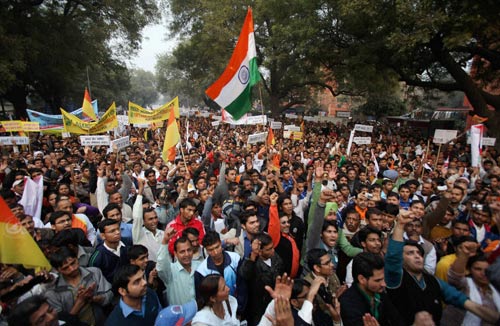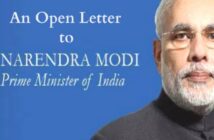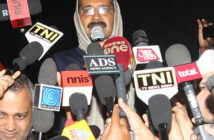By: Ravi Sinha
 Recently during the course of a discussion over the social media, a Supreme Court lawyer friend reminded me of my stiff resistance to the so-called Second Freedom Movement in the garb of Lokpal launched by Anna Hazare and hijacked by the political opportunist Arvind Kejriwal.
Recently during the course of a discussion over the social media, a Supreme Court lawyer friend reminded me of my stiff resistance to the so-called Second Freedom Movement in the garb of Lokpal launched by Anna Hazare and hijacked by the political opportunist Arvind Kejriwal.
This Supreme Court Attorney wrote, “The biggest asset of neutrality Ravi ji lies in non-performing neutrality. Hope you remember your relentless fight against Kejriwal and his cam followers, wherein you have single handedly unleashed a vitriolic attack on those people who were intoxicated by the neo-romanticism of movement (if at all it was). And immediately you are proved right, when we find that the alleged crusaders are nowhere to be seen today. The search for morality, or the lack of it, is merely the pompous face of an inferiority complex.”
The fact of the matter is that behind the pompous faces asking for corruption free moralist society, it was quite visible that the collective intelligence failure of the nation was leading to a holier-than-thou politics. Anna Hazare’s sudden emergence on the centre stage of national politics arousing mass hysteria may have an element of surprise for post-JP generation. After all, they have not seen the mass movements and hence fail to understand the thin line that bifurcates between a national movement and mob hysteria.
But the serious students of conventional school of political science know how the lack of maturity in collective consciousness can easily arouse popular sentiments with someone taking a moral high ground. India and many other developing countries have been even more vulnerable than matured democracies. However, what makes this retired driver-turned-self styled crusader a case study in modern political science is the fact that his sudden upsurge did reflect a collective intelligence failure of the entire civil society, whom Anna has always claimed to represent.
A political campaign turns out to be a national movement only when strong wave of anti-establishment perception is supplemented by an alternative, better and, more importantly, viable political model in mind. Had Anna Hazare’s well orchestrated media event got that element to be called a revolution?
It is a different matter of debate altogether whether a mob of few thousand can be termed the entire civil society. The nation may got into a high voltage Facebook/Twitter discussion on whether Lokpal has been a panacea to the evils of corruption, or academicians started debate whether parliament or any other pressure group in the country will make the law; the core issue of corruption never remained in the spotlight in this cacophony.
It seems the entire nation for some time was driven by a “heard hypothesis” where people were not bothered as to their outburst was at what cost and for whose benefit. The cost-benefit analysis of this media stunt indicates some smart operators of this campaign were the only beneficiaries, though such theatrics has a short shelf life as time proved it.
When I first said collective intelligence failure, I was pretty conscious of the fact that I was inviting some more hate mails calling me anti-national and traitor, some more Facebook comments calling me names, and a journalist as then ruling party agent. However, the fact of the matter is that such knee jerk reactions only strengthened my conviction that nation at that critical juncture was reflecting a collective intelligence failure where Anna Hazare was just the symbol of that malaise.
Let’s face the facts. Corruption in a capitalist economy of a developing nation is an issue and will always be, Lokpal or no Lokpal. But whether it will become a national election issue is a questionable proposition in a society where we enjoy transactional corruption in day-to-day lives and cry foul over collusive corruption at the power and policy level.
The bigger issue to be probed is why such a mobocracy was not nipped in the bud. While a 73-year-old rigid man with a childish ‘my way or highway’ attitude seemed to have kept the entire democratic process and constitution on gun point, this lack of intelligence made one of the largest democracies in the world on a ransom call, and a matter of ridicule for the western powers who were always apprehensive of Indian GDP growing at their cost.
When a larger conspiracy against country’s democratic process was being planned in the name of ‘India Against Corruption’, with a moral high ground, of course, what was the intelligence machinery of the country doing? Why did not it get noticed that people behind this so-called noble cause had alternate channel of foreign funds in their NGOs?
Intelligence officials admit that they could not see this coming, though they had warned the Government of the larger conspiracy coming in post-Ramdev episode. However, this will go as an intelligence failure number one in the history of India’s crisis with political transition.
The second intelligence failure, and the most glaring one, had been by the then ruling establishment, both at the party level and the government level. In the absence of any real grass root leader in the think tank, the Congress Party and the UPA Government kept groping in the dark and took one step forward and two backwards. All their counter-offensive experiments, including hobnobbing with Ramdev, fall flat on their faces.
In this intelligence failure number two, a small time political blackmailing was given legitimacy by none other than the government itself. Why did the government allow a small group of holier-than-thou team to be part of India’s policy making? If engaging the civil society was the objective, there should have been a diverse set of civil society groups to have the real meeting of minds and aspirations. This could also have served the purpose of check & balance in the event of political blackmailing. But it was more of applicable intelligence failure on their part and hence they eventually suffered with a “foot in the mouth” syndrome.
The third glaring intelligence failure, something that once threatened to derail the future democratic process in India, had been by the opposition parties, mainly the BJP. In their quest to topple the UPA Government, backed by their masters in the RSS, their intelligence failed to see the larger picture ahead and hence created a Frankenstein monster in Arvind Kejriwal post Anna Hazare’s realisation that how he was just being used by his own protege. The BJP is today paying the price of it in Delhi and Kejriwal’s well-orchestrated media stunts are BJP’s insult to injury now.
All that the BJP could see at that point of time was a beneficial move in the short term, without realising the heavy price that the party and the nation had to bear in the long term. No democratically elected government, including that of BJP, can afford a rigid civilian old-man with a ‘my way or highway’ stand come in the way of policy making. But their intelligence failure drove them to attempt at creating their own Bhindranwale, that too in the national politics. Today, many BJP leaders privately admit that Kejriwal is too big an embarrassment to Modi Government and the party.
Fourth failure in intelligence was noticed in media which seemed to have forgotten its objectivity and acted as a party to mob inciting. Asking people to react by displaying the Facebook/Twitter ids of Team Anna, media got into a rat race to outscore over the rival channels. Well, the TRP game one can understand, but very much like public outburst such TRPs are easy to get but difficult to sustain. In exchange, media lost its credibility and had this theatrics succeeded in derailing the democracy, media might have been the worst to suffer.
Had your collective wisdom failed to see that this ‘my way or highway’ brand of blackmail politics, if having allowed to grow, could have led to your censorship as well? Why did not you find a single voice of dissent to Anna’s childish behaviour? It is a gang rape to the very ethics of journalism when a media trial takes place in television studio with carefully selected three panelists from Anna Hazare camp and only one against the move.
Will somebody please define whether a crowd of few thousands, making a mockery of law & order can be termed as unprecedented national movement? Did Mahatma Gandhi or Jai Prakash Narain had the luxury of media budget, Twitter/Facebook to incite the mob and gather crowd? Still, lakhs and lakhs of supporters had taken to streets. This is because they not only had a valid reason, but also an alternative, viable and better establishment to offer.
The fifth intelligence failure had been of the ‘Aam Admi’ who would have suffered the most. Howsoever fancy he might be finding the idea of a plebiscite democracy, the fact remains that it is his emotional outburst against corruption that had been channelized by the smart operators in this whole bloody game. Most of the crowd on the road had absolutely no idea what is the basic difference between Lokpal and Jan Lokpal. Everyone seems to have been nursing his own fantasy of a better society the Anna way.
Having said this, intellectuals who were on the other side of the debate and didn’t subscribe Anna Hazare’s method or the madness, are equally to be blamed for being a mute spectator.
Today, Anna has lost whatever moral high ground or credibility he might be having, and Kejriwal being reduced to a Delhi level politician whose only craft is Abusing & Accusing. But the whole episode has left many learning for a society eager for recognition, the lack of which often leads to public sentiments boiling down to mass hysteria.
In a nutshell, it has been the failure of India as a matured democracy. And it has never been about just one Bill. Had this political theatrics succeeded or the government been forced to grant the largesse, by tomorrow there would have been demand for many more such legislations by undemocratic means, by various other pressure groups in the country. And that could have been the beginning of the end of Indian democracy. Sadly, the collective intelligence seems to have not taken any lesson even now, and that threatens to spell doom for India.




